Publishing Talks: David Wilk Interviews Don Linn
March 23, 2010 by David
Filed under Ebooks and Digital Publishing, PublishingTalks
 In this series of interviews, called Publishing Talks, I have been talking to book industry professionals, each of whom has a different perspective about the future of publishing, books, and culture. This is a period of disruption and change for all media businesses.
Publishing has been a crucial part of human culture for as long as people have been writing and reading.
In this series of interviews, called Publishing Talks, I have been talking to book industry professionals, each of whom has a different perspective about the future of publishing, books, and culture. This is a period of disruption and change for all media businesses.
Publishing has been a crucial part of human culture for as long as people have been writing and reading.
How will publishing evolve as our culture is affected by technology, climate change, population density, and the ebb and flow of civilization and its economics? Publishing Talks interviews help us understand the outlines of what is happening, and how we might ourselves interact with and influence the future of publishing as it unfolds. Publishing Talks interviews give people in the book business a chance to talk about ideas and concerns in a public forum that are often only talked about “around the water cooler,” at industry conventions and events, and in emails between friends.
I believe that these interviews give people inside and outside the book industry a chance to hear first hand some of the most interesting and challenging thoughts, ideas and concepts that are currently being discussed within the industry.
I’ve know Don Linn for a number of years, dating back to when he took over the then beleaguered Consortium Book Sales & Distribution, the very excellent but financially challenged distributor of independent literary publishers based in St. Paul, Minnesota. At that point Don took on the very tough job of running a stand-alone book distribution business at a time of great flux in the book business, and did a very fine job of it, by all accounts, finally selling Consortium to the much larger Perseus Books, where it and its many outstanding publisher clients have found safe haven. Don later went on to be publisher at Taunton Books in Newtown, Connecticut, and now has joined the ranks of the independent publishing professional. He’s blogging too, his Mississippi roots showing, at Bait ‘n’ Beer which is both entertaining and edifying.
Here’s his current bio: “Don has a sordid past as an investment banker, cotton and catfish farmer, book distributor, publisher, entrepreneur and general ne’er-do-well. He’s a graduate of Harvard Business School and Vanderbilt University and is endlessly fascinated by books and publishing and their collision with technology. Among other things.”
Don’s intelligence and wit are on display in our talk. His business background and love of books, publishing and the people in the business provide him with a really interesting perspective, and it’s clear he has been thinking hard about the book business and where it is going. He wrote a terrific report on the recent O’Reilly Tools of Change that attracted my attention, and led to this conversation about where publishing is headed in the emerging digital distribution environment. I think his views and opinions will be valuable to publishers of all sizes.
Podcast: Play in new window | Download
J. Phillips L. Johnston: Biscuitville: The Secret Recipe for Building Sustainable Competitive Advantage
March 22, 2010 by David
Filed under Non-Fiction, WritersCast
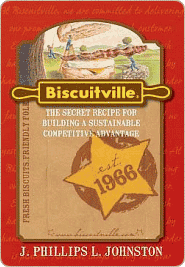
978-1-935212-05-8 – Hardcover – Easton Studio Press – $21.95
Biscuitville – the company – is a small family owned chain of breakfast restaurants based in North Carolina. It’s a very successful company financially, but what makes it special is its commitment to real values and to its people above everything else. This is a company that “walks the talk” in ways that are really striking and deserve attention.
Despite knowing about and even having lived in North Carolina at one point, I had not heard of the company before reading this book. I was really impressed by what I learned here. This is not your standard issue company, nor is this your standard issue business book. Author Phil Johnston is a veteran in business himself, as his biography indicates: he’s a “serial CEO”, having founded 10 successful venture-backed companies, earning him the CED Entrepreneur of the Year award in 1997. He has been a director of five public companies, including a NYSE-listed company. He holds degrees in economics from Duke University, The Stern Graduate School of Business at NYU, his J.D. from the University of North Carolina Law School and was a scholar at the JFK School of Government at Harvard.
This book tells the story of Biscuitville, the company, but the focus of the book is really about seeing this successful small business as a model for how all business should work. Scale is no excuse for giving up the values that have marked the growth of the Biscuitville chain. Anyone in business can learn from the lessons taught by the founders and subsequent generations that are now operating Biscuitville. It’s really a great story, optimistic and uplifting for anyone who wonders whether American business can be saved.
In my interview with author Johnston, we talked about the Biscuitville company story, and how he came to write it, and we touched upon his wide experience in business, especially on the public side, and how the lessons of this small private company can be transferred to bigger businesses and organizations. Phil is a great storyteller, with broad and deep knowledge, and an understanding of business issues I hope more people will get to experience through this talk.
Posted 3.22.10. An excerpt of the book can be found at Chptr1.com.
Podcast: Play in new window | Download
Andrew Coe: Chop Suey: A Cultural History of Chinese Food in the United States
March 17, 2010 by David
Filed under Non-Fiction, WritersCast
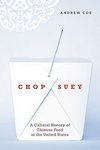 978-0195331073 – Hardcover – Oxford University Press – $24.95
978-0195331073 – Hardcover – Oxford University Press – $24.95
Andrew Coe is a very fine writer indeed – his experience as a journalist shows. Like Mark Kurlansky (Cod, still one of my favorite books among many others he has written), Andrew takes deeply researched historical information and presents them smoothly, telling stories that are packed with fascinating details to bring a subject we think we know into much clearer perspective.
In Chop Suey, Coe takes us on a long journey, beginning in 1784 with the earliest contacts between Americans and China. Throughout, it is hard not to be surprised and sometimes embarrassed by the incredible self centered and disrespectful Americans. At times they were better at understanding and working with the absolute foreignness of Chinese culture and experience than were the Europeans, but only marginally so. At the time the first wave of Chinese immigrants came to America in the mid-19th century, only a few Americans knew anything meaningful or substantive about China and the Chinese, and much of what they did “know” was untrue or seriously exaggerated. And later, American xenophobia reached astonishing heights, as Coe documents, with the now forgotten banning of citizenship to Chinese people who had as much right to be here as any other immigrants.
The gulf of understanding between Americans and Chinese had a great deal to do with the way Chinese food was received in this country, but Coe documents in compelling detail, the way that Chinese cuisine came to become the integral part of the American cuisine that it is today, with over 40,000 Chinese restaurants of many different kinds. With the gradual Chinese migration to the East Coast, eventually New York “Bohemians” discovered Chinese restaurants, and made wildly popular, the seemingly new dish, chop suey. In fact, according to Coe, it was a peasant cuisine from one part of China that came to dominate Chinese-American restaurants.
There are many great stories along the way to where we are today. Coe talks about how American Jews fell in love with Chinese restaurants and in particular makes a great story of President Richard Nixon’s 1972 trip to China and how it opened minds and palates across America. This was a particularly fun part of the book for me. For anyone who loves food of any kind, and especially the intersection of food and culture, this book will be a pleasure to read.
Talking to Andrew was a pleasure. He gives a terrific interview – fully in command of his subject, and really fun to talk with. I think that hearing our discussion will encourage readers to seek out this wonderful book. I am certainly looking forward to his next book.
Podcast: Play in new window | Download
Mary Sharratt: Daughters of the Witching Hill
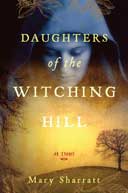
978-0547069678 – Hardcover – Houghton Mifflin Harcourt – $24.00
I really enjoyed reading this book and came to admire its author, not only for her writing skills, which are very good indeed, but because she was able to so deeply and movingly inhabit her characters in a place and time so foreign from our own. Mary Sharratt’s novel is transcendent in many ways. It centers around the years leading up to the 1612 Lancashire, England, witch trials that resulted in the executions of nine supposed witches. Mary Sharratt has brilliantly imagined her story, in which witchcraft is real, albeit not evil in the way the accusers made out. It’s much more complicated – in fact this witchcraft is the folk medicine and healing power of the local spirits of pre-Christian England. Never preachy, Sharratt gives us a countryside where politics and money separate people from one another, and crushing poverty is the lot of so many.
Widowed mother Bess Southerns supports her family and friends by healing the sick, telling fortunes, and blessing those facing misfortune, conjuring charmes that combine forbidden Catholic ritual, medicinal herbs, and guidance provided by her spirit-friend, Tibb. Bess is always careful, knowing the dangers her powers create for her but eventually everything unravels in a series of events that finally gets Bess, her family, friends and supporters into inevitable trouble with the law. Sharratt has crafted a beautiful historical novel that brings this era to life and gives its people she writes about a deep and complex life that many will find surprising. The conflicts between religions, as well as the conflicts between class are here, as well as mystery and suffering and beauty too. The book is set in the English countryside where the author, an American, currently lives. It’s clear to me that Mary Sharratt has allowed this place to inhabit her, as much as she it. She has put together a beautifully crafted story, full of complexity and compelling characters, and even knowing how the book must end, I was hooked from beginning to end.
As a reader I was transported there with her, and found her story uplifting, painful, and beautiful all at the same time. This is a wonderful book.
In my interview with Mary, we talked about her experience as an American living in the English countryside, and how she came to write this book. We talked about the story itself, her characters, their lives, the nature of English witchcraft of the 16th century, power and politics and the warp and weave of her excellent story.
Podcast: Play in new window | Download
Publishing Talks: David Wilk interviews Kent Anderson
March 9, 2010 by David
Filed under PublishingTalks
 In this series of interviews, called Publishing Talks, I have been talking to book industry professionals, each of whom has a different perspective about the future of publishing, books, and culture. This is a period of disruption and change for all media businesses.
Publishing has been a crucial part of human culture for as long as people have been writing and reading.
In this series of interviews, called Publishing Talks, I have been talking to book industry professionals, each of whom has a different perspective about the future of publishing, books, and culture. This is a period of disruption and change for all media businesses.
Publishing has been a crucial part of human culture for as long as people have been writing and reading.
How will publishing evolve as our culture is affected by technology, climate change, population density, and the ebb and flow of civilization and its economics? Publishing Talks interviews help us understand the outlines of what is happening, and how we might ourselves interact with and influence the future of publishing as it unfolds. Publishing Talks interviews give people in the book business a chance to talk about ideas and concerns in a public forum that are often only talked about “around the water cooler,” at industry conventions and events, and in emails between friends.
I believe that these interviews give people inside and outside the book industry a chance to hear first hand some of the most interesting and challenging thoughts, ideas and concepts that are currently being discussed within the industry.
In this interview, I had the pleasure of talking to Kent Anderson, Editor-in-Chief of the Scholarly Kitchen, an Society for Scholarly Publishing member, and former Board member. Kent has a BA in English as well as an MBA. He is currently CEO/Publisher for the Journal of Bone & Joint Surgery. He formerly worked in the Massachusetts Medical Society’s Publishing Division in Product Development and International Business and as Publishing Director for the New England Journal of Medicine. He’s been a publisher, managing editor, copy editor, graphic designer, typesetter, editor, and author. He’s worked at the American Academy of Pediatrics, Medical Economics, and 3M, in addition to other odd jobs here and there (notice, this construction makes all the jobs odd). And interestingly, he also writes mystery novels in his spare time (he writes the Johnny Denovo Mysteries under the pen name Andrew Kent). He wrote a very intelligent article about publishing his latest book for the Self-Publishing Review. And lastly he is a member of an innovative authors’ collective Backwords Books. Busy guy!
We covered alot of interesting ground in our talk, starting with a long discussion about Jaron Lanier’s latest book, called You Are Not a Gadget, that Kent recently reviewed in depth in the Scholarly Kitchen, a book that raises a number of really interesting concerns about the way the open online economy is working. That was a great starting off point for a really interesting discussion about online publishing, devices, valuations and pricing, web business models, and many other related subjects.
Podcast: Play in new window | Download
Dolen Perkins-Valdez: Wench
March 4, 2010 by David
Filed under Fiction, WritersCast
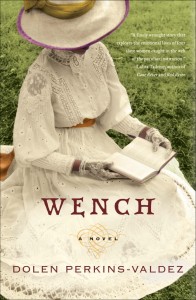 978-0061706547 – Hardcover – Amistad/HarperCollins – $24.99
978-0061706547 – Hardcover – Amistad/HarperCollins – $24.99
Dolen Perkins-Valdez’ first novel, Wench, just blew me away. The writing is beautiful, and the story is compelling. Perkins-Valdez has been able to imagine her characters in a very difficult time, in very difficult circumstances, capturing their pain and suffering as well as their joys, and the complexity of life lived by humans. No stick figures here, male or female, black or white. The author is sympathetic in the strongest sense of that word – she understands people. She does not excuse anything, but she is able to imagine who they are, and therefore her readers are given no excuses either. Here’s the story of the book (I took this from the author’s own website, which is one of the better author websites I have seen recently):
In 1851, a lawyer named Elias P. Drake purchased a plot of land near Xenia, Ohio with the intent to establish a summer vacation resort where the country’s elite could relax and enjoy the mineral springs in the area. At the time, it was believed that natural water could cure illnesses and bring about good health. What made this resort unusual, however, was that it became a popular vacation destination for southern slaveholders and their enslaved mistresses. Ultimately, these flagrantly open relationships offended the northern abolitionists who also frequented the resort. After four years, the resort closed.
This part of the story has been confirmed by historians. I took this forgotten historical note and sketched in a fictional account of what it would have been like to be an enslaved woman traveling to this free state each summer. Why wouldn’t the women try to escape? What kinds of emotional attachments did they have with these men? Initially, I believed that it was entirely possible that they actually loved the men. Ultimately, I discovered that it was much more complicated than that.
Situated in the free state of Ohio, Tawawa House offers respite from the summer heat. A beautiful, inviting house surrounded by a dozen private cottages, the resort is favored by wealthy Southern white men who vacation there, accompanied by their enslaved mistresses.
Regular visitors Lizzie, Reenie, and Sweet have forged an enduring friendship. They look forward to their annual reunion and the opportunity it affords them to talk over the changes in their lives and their respective plantations. The subject of freedom is never spoken aloud until the red-maned, spirited Mawu arrives and voices her determination to escape. To run is to leave behind the friends and families trapped at home. For some, it also means tearing the strong emotional and psychological ties that bind them to their masters.
When a fire on the resort sets off a string of tragedies, Lizzie, Reenie, and Sweet soon learn tragic lessons,that triumph and dehumanization are inseparable and that love exists even in the cruelest circumstances as they bear witness to the end of an era.
That’s the bare bones of the story. Obviously, you need to read this book to understand how good it is. And do listen to this interview. In it, Dolen talks about how she became a writer, how this book came about, how she feels about her characters, and a great deal more. Dolen Perkins-Valdez is a writer who deserves our attention. I’m very much looking forward to her next book, and hoping she will be writing many more after that.
As an aside, the cover is beautiful, and perfect for this book, and has a sort of subliminal effect on me, which maybe contributed subtly to how much I liked reading this book and talking to its author.
Podcast: Play in new window | Download
Publishing Talks: David Wilk interviews Morgan Entrekin
February 26, 2010 by David
Filed under PublishingTalks
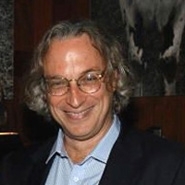 In this series of interviews, called Publishing Talks, I am talking to book industry professionals who have varying perspectives and thoughts about the future of publishing, books, and culture. This is a period of disruption and change for all media businesses.
Publishing has been a crucial part of human culture for as long as people have been writing and reading.
In this series of interviews, called Publishing Talks, I am talking to book industry professionals who have varying perspectives and thoughts about the future of publishing, books, and culture. This is a period of disruption and change for all media businesses.
Publishing has been a crucial part of human culture for as long as people have been writing and reading.
How will publishing evolve as our culture is affected by technology, climate change, population density, and the ebb and flow of civilization and its economics? Publishing Talks interviews help us understand the outlines of what is happening, and how we might ourselves interact with and influence the future of publishing as it unfolds. Publishing Talks interviews give people in the book business a chance to talk about ideas and concerns in a public forum that are often only talked about “around the water cooler,” at industry conventions and events, and in emails between friends.
I hope that Publishing Talks interviews will give people inside and outside the book industry a chance to hear about some of the thoughts, ideas and concepts that are currently being discussed by engaged individuals within the industry.
Morgan Entrekin is the iconic publisher of Grove Atlantic, one of the most prominent and successful midsized literary publishers of the past couple of decades. He has all the chops of a “traditional” book publisher: a great commitment to authors and their texts, a belief in the enduring power of a great backlist. But he is also an astute marketer who understands readers and the necessity for publishers to pay attention to what readers want and need.
Entrekin grew up in Nashville, graduated from Stanford in 1977, started in the business at Delacorte Press, working under the late, great Seymour Lawrence and editing the likes of Jayne Anne Phillips, Richard Brautigan, and Kurt Vonnegut. In 1982 he moved over to Simon & Schuster, where he made his name by championing, acquiring and editing Bret Easton Ellis’s breakout novel Less Than Zero. In 1984 he created his own imprint within Atlantic Monthly Press, Morgan Entrekin Books and a few years later he bought Atlantic outright; two years after that, he purchased Grove Press, which featured one of the great backlists that included D.H. Lawrence, Henry Miller, and Samuel Beckett.
Entrekin’s gained well deserved fame and credit for publishing Charles Frazier’s Cold Mountain in 1995. In the course of promoting the novel, Entrekin is credited with more or less creating the pre-publication tour, sending Frazier to meet book buyers in various cities before the book landed in stores. It paid off: Cold Mountain was a huge success, sold over 1.5 million copies, won the National Book Award, and was made into a big-budget Hollywood movie. Other notable Grove/Atlantic titles include Mark Bowden’s Black Hawk Down, Candace Bushnell’s Sex and the City, as well as the works of Sherman Alexie and P.J. O’Rourke.
We had a terrific talk, covering a wide range of interesting topics, from the current state of the book business, to the kinds of things that Entrekin is doing at Grove/Atlantic to stay current. Morgan is thoughtful, intelligent and incisive on every topic he discusses; he cares deeply about the books he publishes, backlist and frontlist titles alike, and is clearly still motivated and excited by the same beliefs and ideas that brought him into the book business in the first place. Anyone interested in understanding how a publisher can navigate the changing landscape of the business will benefit from listening to what he has to say in this interview.
Podcast: Play in new window | Download
Kelli Stanley: City of Dragons
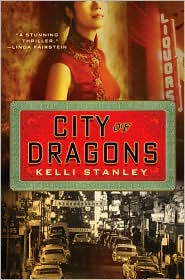
978-0312603601 – Hardcover – Thomas Dunne/Minotaur Books – $24.99
Reading Kelli Stanley’s City of Dragons was a pleasure from beginning to end. I liked her incredible attention to details in the San Francisco of the 1940s setting. I really liked her main character, the wounded private eye, Miranda Corbie. Kelli’s love of noir fiction, and love for a great story really show. Good fiction should be able to take you into another place and time coupling the author’s skills with your own imagination. This book certainly succeeds in grabbing you early, and keeping your attention. Anyone who has read and loved the great classic detective novels will feel at home with Kelli Stanley’s writing. And she has that political edge that so many writers of the 30s and 40s brought to their work.
There’s a lot going on here. You can feel San Francisco in the dark of pre-World War II, taste the cigarettes and booze, and feel the very real danger her characters experience, the otherness of Chinatown, and the deaths and broken lives that dot this sometimes harsh and painful cityscape. And you can feel throughout how much heart and soul the author has put into this book. It’s a pleasure to read, and has a story that won’t let go. Lots of fun overall, and City of Dragons works on many levels, so it will satisfy readers looking for entertainment or something with a bit more depth as well.
Kelli loves her work and loves to talk about it too, so we had a great conversation. This is a writer with a great future and I am very much looking forward to her next book. I’m also hoping to get her to contribute a reading from this novel to Writerscast in the near future. Kelli’s own website is worth a visit as well. City of Dragons is available as an e-book in various formats, and in digital audio as well.
Podcast: Play in new window | Download
Kermit Moyer: The Chester Chronicles

978-1579621940 – Hardcover – Permanent Press – $28.00
What a pleasure it was to discover this writer. The Chester Chronicles is a collection of interlocking stories that serve to create what is essentially a coming-of-age novel. We are introduced to Chet Patterson as a pre-adolescent and stay with him as he grows unto early manhood. He is the son of a military man, so at the heart of the book is the peripatetic journey of a budding intellectual, who often does not fit in with the crowd and is always in search of both his internal and his social identity. There are lots of adventures along the way, many having to do with girls and sex, boys and drinking.
There are certainly elements here that will be most familiar to people of a certain age, who lived through the ’50s and ’60s, especially the defining moments of those times. But as with any good book, the character and his story transcend the specifics of the place and time in which the book is set. The point is, after all, for us to see him as a person on a journey, and to understand where he has been, and perhaps also, therefore, to understand who he will become. As the author says of himself and of his character, he is “plagued with Oedipal anxieties and existential doubt, yet nonetheless convinced of his heroic destiny.” There are several moment in the book that can make the reader laugh out loud, and there are others where it is equally impossible not to deeply feel his pain. I’d say that’s a pretty good accomplishment for any writer.
In my interview with Kermit Moyer, we talked about some of the autobiographical elements of the book, some of the stories which stood out for me as a reader, as well as some of the characters in the book that affected me the most. We talked quite a bit about autobiographical fiction and how this book fits into the tradition of fictionalized autobiography and works transformationally both for the author and the reader. Moyer provides an interesting explanation of his writing which I hope will help introduce new readers to his fine writing.
Podcast: Play in new window | Download
Publishing Talks: David Wilk interviews Richard Curtis
February 11, 2010 by David
Filed under PublishingTalks

In this series of interviews, called Publishing Talks, I am talking to book industry professionals who have varying perspectives and thoughts about the future of publishing, books, and culture. This is a period of disruption and change for all media businesses.
Publishing has been a crucial part of human culture for as long as people have been writing and reading.
How will publishing evolve as our culture is affected by technology, climate change, population density, and the ebb and flow of civilization and its economics? Publishing Talks interviews help us understand the outlines of what is happening, and how we might ourselves interact with and influence the future of publishing as it unfolds. Publishing Talks interviews give people in the book business a chance to talk about ideas and concerns in a public forum that are often only talked about “around the water cooler,” at industry conventions and events, and in emails between friends.
I hope that Publishing Talks interviews will give people inside and outside the book industry a chance to hear about some of the thoughts, ideas and concepts that are currently being discussed by engaged individuals within the industry.
Richard Curtis, president of Richard Curtis Associates, Inc., is a leading New York literary agent and a well-known author advocate. He is also the author of numerous works of fiction and nonfiction including several books about the publishing industry. His interest in emerging media and technology has enabled him to help authors anticipate trends in publishing and multimedia. He has lectured extensively and conducted panels and seminars devoted to raising consciousness in the author and agent community about the future of communications. He was the first president of the Independent Literary Agents Association and subsequently president of ILAA’s successor organization, the Association of Authors’ Representatives (AAR) He blogs regularly on www.ereads.com. He is also, uniquely among literary agents, a publisher himself, having founded the innovative digital publishing imprint, E-Reads almost ten years ago.
I have known Richard for a very long time, have done business with him, and collaborated with him on an experimental publishing project a few years ago, But mostly, over the years, Richard and I have talked about the book business, the future of publishing and of authors, and particularly, the future of digital publishing. So it made a lot of sense for me to talk to Richard as part of the Publishing Talks series, as I knew he would have a great deal of interesting and compelling ideas to share about these subjects, which he almost always does.
Podcast: Play in new window | Download
